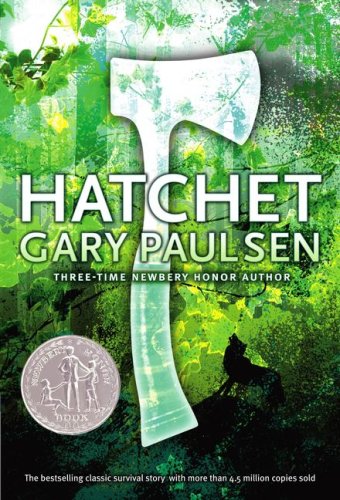By Gary Paulsen
New York: Simon Pulse (1987)
Today more than ever, divorce is one of those topics that kids should learn about and feel comfortable discussing. With such a high rate of divorce in our country, it is inevitable that as teachers, we will encounter various children struggling with or living with divorce as their reality. That is why good literature about divorce is crucial to have on hand and to discuss in the classroom, whether in a group or individually. The inside cover of Hatchet states that the story is one of dual survival: Brian must learn to survive the Canadian wilderness as well as his parents' recent divorce. Ultimately, I was disappointed with the second aspect of this story.
Brian has a Secret, a great Secret that he is afraid to tell is father but that prevents him from looking at his mother in the same way. So when his mother drives him to the airport to go and stay with his dad for a few months over the summer, Brian does not know what to think. Unfortunately, the pilot has a heart attack while they're in the air, and Brian is forced to fly the plane until it runs out of fuel, at which point he maneuvers it to crash in the safest way he can think of. He survives, but he runs into one problem after the next as he finds a way to build shelter, feed and protect himself, and hopefully attract the attention of the search party he is sure is looking for him.
One aspect of the story I did like was the emphasis on using the skills and the materials available to you. Brian uses every resource he has, from his shoe laces to the tattered windbreaker he crashed in, and as time goes by he learns how to use the resources abundant in the forest around him. However, Brian is thirteen years old, and I had difficulty accepting some of the skills he was able to perform. For instance, Brian figures out how to build a bow--in two tries. He only runs into wild animals a handful of times in the nearly two months he is stranded, and only once does that animal try to hurt him. He builds a shelter by weaving branches of trees together tightly, even creating a chimney for the smoke to exit. While these are commendable skills that largely contributed to his survival, I just kept wondering how realistic it was for a thirteen-year-old to know how to perform them. Finally, putting all of this aside, these skills did not contribute at all to his rescue. Once he was finally able to get into the sunken plane and retrieve the survival pack (inside which everything was miraculously intact, despite being submerged for two months), what saved him was an accidental press of a button on a device that turned out to be an emergency transmitter. When he was finally found, he was not cooking the birds and fish in the way he had learned to do through experience, but was boiling in pots a large turkey dinner for four. I did not like this because it suggested that everything he had done previously did nothing to save him--only the "creature comforts" he had just found really helped him.
However, my main issue with the work was not in plot, but in theme. For the first half of the book, it is evident that Brian really struggles with his parents' divorce. He saw something he wished he had not, and is afraid to tell anyone about it because it brings up his own complicated feelings. The first half of the story mentions frequent bouts of contemplation about the divorce, his own feelings, and what life would be like from then on. After this first half, however, the theme almost entirely disappears. Abruptly, the narrative focuses only on the literal survival in the wilderness. As I was reading, I kept assuming that the circle would close in the end, that he would apply his newfound physical maturity to his emotions about his family. Even in the epilogue, however, only the last three sentences are dedicated to the divorce. Paulsen writes, "for a week it looked as if they might actually get back together" and "Brian tried several times to tell his father, came really close once to doing it, but in the end never said a word about the man or what he knew, the Secret" (p. 189). And that is where the story ends. This made me very upset when I first read it because it does not show any emotional growth. I think that the focus should not be on whether the parents get back together, but instead how they go forward as a family (even one broken apart).
That last line, though, is my least favorite part of the story. Brian never spoke to his father about what he knew; if a child is reading this and has questions for his own parents about their divorce, this would not encourage him to be open about his feelings or opinions. I think it is important that children communicate their feelings, good or bad, about such difficult topics, especially with those they are closest to. Brian's example does not encourage this communication, and for that reason I don't think I would use this book if a student comes to me struggling with divorce in his family.
That being said, I don't think this book should be excluded from the classroom. It is an exciting survival story of just an regular boy, and I'm sure that kids would enjoy reading about how he finds resources around him. To teach about divorce or offer resources to students, however, I think I will at the very least find other stories in which the children are allowed to confront and express their feelings, and offer those examples in combination with this one.

No comments:
Post a Comment